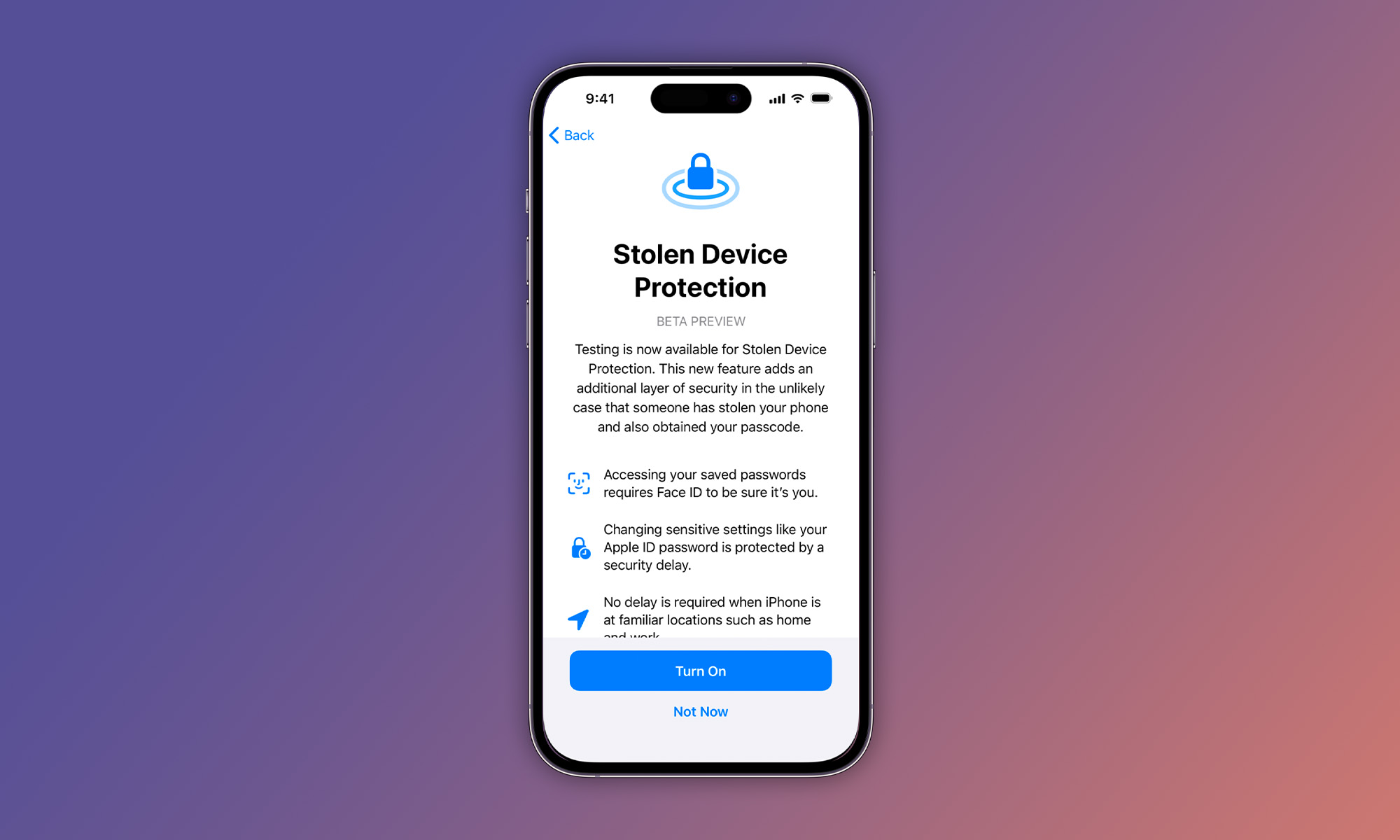News
Apple Releases iOS 17.3 Featuring Stolen Device Protection
The new theft protection feature aims to safeguard personal data in the event an iPhone or iPad is stolen.

Apple has rolled out the latest incremental system updates to its mobile and desktop operating systems, with iOS 17.3 bringing a noteworthy feature to iPhones and iPads dubbed Stolen Device Protection, aimed at safeguarding personal data in the event of theft.
In the unfortunate event of your iPhone or iPad being stolen, iOS 17.3 allows you to bar unauthorized access by forcing Face ID or Touch ID verification. The security measure remains effective even if a thief has your passcode and should render any attempts to access your device futile.
As an added security layer, iOS 17.3 introduces an automatic one-hour security delay before permitting passcode modifications if the device is detected in an unfamiliar location. While Stolen Device Protection may not entirely deter thieves, it significantly complicates their efforts.
Also Read: Samsung Unpacked 2024: Key Product Announcements
iOS 17.3 also introduces minor enhancements such as collaborative playlists in Apple Music, support for AirPlay in hotels, improved crash detection, and a collection of new wallpapers commemorating Black History Month.
The following iOS devices support iOS 17.3:
- iPhone Xs
- iPhone Xs Max
- iPhone XR (from 2018 onwards)
- iPhone 11
- iPhone 12
- iPhone 13
- iPhone 14
- iPhone 15
- iPhone SE (2nd and 3rd-gen)
Meanwhile, iPadOS 17.3 extends support to various models, including:
- iPad Mini (5th-gen and later)
- Standard iPad (6th-gen and later)
- iPad Air (3rd-gen and later)
- All iPad Pro models
Users can check for the update in their system settings.
To enable Stolen Device Protection, navigate to the “Face ID & Passcode” section within the Settings menu. Activating it is as simple as scrolling down and toggling the “Stolen Device Protection” switch from “Off” to “On”. No further configuration is necessary.
News
Alienware Just Announced Six New Gaming Monitors
The new models include three QD-OLED and three budget-friendly QHD options, expanding the company’s lineup for all gamers.

Alienware has just updated its gaming monitor lineup with six new additions, including the highly anticipated Alienware 27 4K QD-OLED Monitor. The latest wave of releases is set to reach more gamers than ever, offering high-end QD-OLED displays alongside more budget-friendly options.
The latest displays clearly show that the company is doubling down on QD-OLED with three new models sporting the technology. A redesigned Alienware 34 Ultra-Wide QD-OLED Monitor is also making a return, further refining what is already a fan-favorite display.
A Unified Design: The AW30 Aesthetic
All six monitors feature Alienware’s new AW30 design language, first introduced at CES. The AW30 aesthetic brings a futuristic, minimalist look that unites the entire lineup under a cohesive visual identity.
Pushing QD-OLED Even Further
The refreshed Alienware 34 Ultra-Wide QD-OLED Monitor (AW3425DW) builds on its predecessor’s success with a 240Hz refresh rate (up from 175Hz) and HDMI 2.1 FRL support. It also gains G-SYNC Compatible certification alongside AMD FreeSync Premium Pro and VESA AdaptiveSync, ensuring ultra-smooth performance. With a WQHD (3440×1440) resolution and an 1800R curve, this display enhances immersion for both gaming and cinematic experiences.
For those who crave speed, the Alienware 27 280Hz QD-OLED Monitor (AW2725D) pairs a high refresh rate with QHD resolution, balancing sharp visuals with ultra-smooth gameplay. Meanwhile, the Alienware 27 4K QD-OLED Monitor (AW2725Q) delivers stunning clarity with an industry-leading pixel density of 166 PPI, making it the sharpest OLED or QD-OLED monitor available.
Also Read: Infinite Reality Acquires Napster In $207 Million Deal
Worried about OLED burn-in? Alienware’s entire QD-OLED lineup comes with a three-year limited warranty covering burn-in concerns, offering peace of mind for gamers investing in these high-end displays.
Bringing QHD To A Wider Audience
Alongside QD-OLED, Alienware is also releasing three new QHD gaming monitors aimed at more price-conscious gamers. The Alienware 34 Gaming Monitor (AW3425DWM), Alienware 32 Gaming Monitor (AW3225DM), and Alienware 27 Gaming Monitor (AW2725DM) provide a range of sizes and formats to suit different preferences:
- The Alienware 34 Gaming Monitor (AW3425DWM): An ultrawide (WQHD) option for a panoramic, immersive experience.
- The Alienware 32 Gaming Monitor (AW3225DM): A standard 16:9 panel for a traditional but expansive desktop setup.
- The Alienware 27 Gaming Monitor (AW2725DM): A 27” display offering the same performance in a more compact form factor.
All three gaming monitors feature a fast 180 Hz refresh rate, a 1ms gray-to-gray response time, and support for NVIDIA G-SYNC, AMD FreeSync, and VESA AdaptiveSync to eliminate screen tearing. Additionally, with 95% DCI-P3 color coverage and VESA DisplayHDR400 certification, these displays deliver vibrant colors and high dynamic range for lifelike visuals.



























